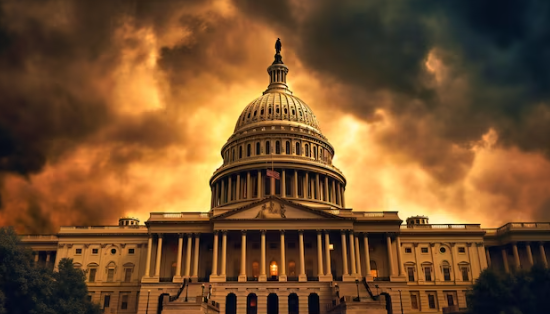Political Scandals
Introduction
Scandals have long been a pivotal aspect of political life in the United States, shaping public opinion, influencing elections, and driving policy changes. Understanding the dynamics of scandals is crucial for AP US Government students, as it provides insight into the mechanisms of political accountability, media influence, and the interplay between public perception and political outcomes.
This comprehensive guide delves into the definition of scandals, their impact on politics and society, and the role of media in amplifying or mitigating their effects.
What are Scandals?
Scandals are events or actions that involve serious wrongdoing, often leading to public outrage and intense media scrutiny. In the political arena, scandals typically involve unethical behavior, corruption, or illegal activities by public officials or prominent figures.
The media plays a significant role in reporting these scandals, shaping how the public perceives the individuals involved and the broader political landscape.
Key Characteristics of Political Scandals:
- Unethical Behavior: Actions that violate moral or professional standards.
- Corruption: Abuse of power for personal gain.
- Illegal Activities: Engagement in actions that break the law.
- Public Outrage: Negative reaction from the public and stakeholders.
- Media Scrutiny: Extensive coverage and investigation by journalists and media outlets.
Scandals can range from financial misconduct and misuse of power to personal indiscretions and breaches of public trust. Their repercussions often extend beyond the immediate fallout, influencing long-term political dynamics and governance structures.
5 Must Know Facts About Political Scandals
1. Investigative Reporting is Crucial
Scandals often emerge from investigative journalism, where journalists meticulously research and uncover hidden facts about misconduct or unethical behavior by public officials. Investigative reporters play a watchdog role, holding those in power accountable and bringing issues to public attention that might otherwise remain concealed.
2. Variable Impact of Scandals
The impact of a scandal can vary widely. Some scandals lead to significant consequences, such as resignations, loss of public trust, or even legal action against the individuals involved. Others may have minimal effects, depending on factors like the severity of the wrongdoing, public interest, and the political climate at the time.
3. Media Sensationalism Can Overshadow Key Issues
Media coverage of scandals can sometimes create a sensational narrative that overshadows more important policy issues. This focus on personality and controversy can divert public attention from substantive discussions about governance, policy-making, and critical national issues.
4. Social Media Transforms Scandal Reporting
The advent of social media has revolutionized how scandals are reported and disseminated. Information spreads rapidly, and public reactions can be instantaneous and widespread. However, this also opens the door to misinformation and the rapid escalation of unverified claims, complicating the public’s understanding of the scandal.
5. Long-Term Effects on Legislation and Governance
Political scandals can lead to lasting changes in legislation and governance. In response to scandals, there may be new laws or reforms aimed at preventing similar misconduct in the future. Additionally, scandals can influence governance practices, promoting greater transparency and accountability among public officials.
Review Questions
How does media coverage of scandals influence public perception of political figures?
Media coverage plays a crucial role in shaping public perception of political figures involved in scandals. When the media highlights unethical behavior or illegal actions, it can lead to significant shifts in public opinion. This negative portrayal often results in decreased trust in the individuals and their ability to govern effectively.
Additionally, the way the media frames the scandal—focusing on sensational details or broader implications—can further influence public sentiment, either exacerbating outrage or tempering it based on the narrative presented.
Analyze the relationship between investigative journalism and the emergence of scandals in politics.
Investigative journalism serves as a watchdog for democracy by uncovering scandals that might otherwise remain hidden. Journalists dedicate extensive resources to probe into allegations of corruption or misconduct among political figures. When these investigations reveal significant wrongdoing, they can lead to high-profile scandals that spark public outcry and demand accountability from elected officials.
This dynamic underscores the vital role of a free press in maintaining transparency and integrity within government, ensuring that public officials are held accountable for their actions.
Evaluate the long-term effects that political scandals have had on governance and policy-making processes.
Political scandals can profoundly impact governance and policy-making processes by shifting priorities and altering the focus of legislators. Following a scandal, there may be increased scrutiny on related issues, prompting reforms or legislative changes aimed at preventing future misconduct.
However, scandals can also create a climate of distrust between politicians and constituents, complicating bipartisan cooperation on important policies. The repercussions often extend beyond immediate consequences, influencing electoral outcomes and altering party dynamics over time, thereby affecting the overall functioning and stability of government institutions.
Related Terms
Investigative Journalism
A form of journalism that seeks to uncover hidden information and expose wrongdoing, often focusing on issues of public interest such as corruption and scandals. Investigative journalists conduct in-depth research, interviews, and data analysis to reveal facts that are not readily accessible to the public.
Public Opinion
The collective attitudes and beliefs of individuals on various issues, which can be significantly swayed by media coverage of scandals. Public opinion plays a critical role in democratic societies, influencing policy decisions and electoral outcomes.
Media Framing
The way in which the media presents information about a scandal, influencing how the public perceives the issue and the individuals involved. Media framing can highlight certain aspects of a story while downplaying others, shaping the narrative and public interpretation.
Political Corruption
The abuse of power by government officials for illegitimate private gain. Political corruption can involve bribery, embezzlement, nepotism, and other unethical practices that undermine the integrity of governance.
Political Accountability
The principle that government officials are responsible for their actions and must answer to the public and legislative bodies. Scandals often test the mechanisms of political accountability, determining whether officials face consequences for misconduct.
Examples of Notable Political Scandals
Watergate Scandal (1972-1974)
One of the most infamous political scandals in U.S. history, the Watergate Scandal involved a break-in at the Democratic National Committee headquarters and the subsequent cover-up by members of President Richard Nixon’s administration. The scandal led to Nixon’s resignation in 1974 and had lasting impacts on public trust in government.
Teapot Dome Scandal (1921-1923)
A major bribery scandal during President Warren G. Harding’s administration, the Teapot Dome Scandal involved the secret leasing of federal oil reserves by the Secretary of the Interior, Albert B. Fall, in exchange for personal payments. It exposed corruption at high levels of government and resulted in the first-ever federal prison sentences for cabinet members.
Clinton-Lewinsky Scandal (1998)
This scandal involved President Bill Clinton’s extramarital affair with White House intern Monica Lewinsky and the subsequent impeachment proceedings. The scandal polarized public opinion and had significant political ramifications, including Clinton’s eventual acquittal by the Senate.
Iran-Contra Affair (1985-1987)
A political scandal during the Reagan administration, the Iran-Contra Affair involved the secret sale of arms to Iran and the diversion of proceeds to fund Contra rebels in Nicaragua. The scandal raised questions about executive power and congressional oversight, leading to multiple investigations and convictions of officials involved.
Impact of Scandals on Elections
Political scandals can have profound effects on elections, influencing voter behavior and electoral outcomes. Here are some ways scandals impact elections:
Voter Trust and Perception
Scandals can erode voter trust in candidates and incumbent officials, leading to decreased support and potential losses in elections. Negative perceptions created by scandals can be difficult to overcome, even if the individual involved is acquitted or cleared of wrongdoing.
Campaign Dynamics
During election campaigns, opponents can exploit scandals to weaken their rivals’ standing and credibility. Media coverage of scandals provides ammunition for negative campaigning, potentially swaying undecided voters.
Electoral Outcomes
Scandals can alter the trajectory of elections, leading to unexpected results. Incumbents embroiled in scandals may lose their seats, while opponents may gain momentum and voter sympathy by positioning themselves as ethical alternatives.
Policy Shifts
In the aftermath of a scandal, elections may focus more on issues of ethics and accountability, prompting candidates to prioritize transparency and integrity in their platforms.
Media’s Role in Shaping Scandals
The media plays a crucial role in shaping the narrative and impact of political scandals. Here’s how:
Exposure and Investigation
The media serves as a watchdog by investigating and exposing unethical behavior and corruption. Investigative journalism brings hidden misconduct to light, initiating the scandal and triggering public and political responses.
Framing the Narrative
How the media frames a scandal can influence public perception. Emphasizing certain aspects over others can shape whether the public views the scandal as a significant issue or downplays its importance.
Sensationalism vs. Objectivity
While sensational coverage can amplify the scandal’s impact, objective reporting ensures balanced and accurate representation. Media outlets must navigate the fine line between attracting viewership and maintaining journalistic integrity.
Social Media Amplification
Social media platforms accelerate the spread of information about scandals, allowing rapid dissemination and real-time public reactions. However, this also facilitates the spread of misinformation and partial narratives, complicating the public’s understanding of the scandal.
Public Opinion Shaping
Continuous media coverage keeps scandals in the public eye, sustaining public interest and influencing opinion over time. This persistent attention can pressure political figures to address the scandal and implement reforms.
Conclusion
Scandals are integral to the political landscape, serving as catalysts for accountability, reform, and shifts in public perception. They highlight the importance of a free and investigative press in maintaining transparency and integrity within government institutions.
For AP US Government students, understanding the dynamics of political scandals provides valuable insights into how ethics, media, and public opinion interact to shape the course of governance and democracy.
By examining notable scandals, their impacts on elections, and the media’s role in shaping narratives, students can better grasp the complexities of political accountability and the mechanisms that uphold democratic principles.
As future voters and potential policymakers, recognizing the significance of scandals equips students to critically evaluate political actions and advocate for ethical governance.
Stay informed, stay critical, and embrace the lessons that political scandals offer in the pursuit of a more transparent and accountable government!
Frequently Asked Questions (FAQs)
1. What is a political scandal, and why do they occur?
A political scandal is an event or series of events that involve unethical, illegal, or improper actions by public officials or prominent figures. Scandals occur due to corruption, abuse of power, personal misconduct, or policy failures.
They arise when wrongdoing is exposed, often through investigative journalism, leading to public outrage and demands for accountability.
2. How does investigative journalism contribute to the emergence of political scandals?
Investigative journalism uncovers hidden or concealed information about misconduct or unethical behavior by public officials. Journalists conduct in-depth research, interviews, and data analysis to expose wrongdoing, bringing scandals to public attention and prompting official investigations or legal actions. This watchdog role is essential for maintaining transparency and integrity within government.
3. Can political scandals ever have positive outcomes?
While scandals are inherently negative, they can lead to positive outcomes such as increased transparency, strengthened regulations, and reforms aimed at preventing future misconduct. Scandals can also empower citizens to demand greater accountability and ethical standards from their leaders.
4. How do social media platforms affect the reporting and perception of political scandals?
Social media platforms amplify the reach and speed of reporting on political scandals, allowing information to spread rapidly and engage a broader audience. They facilitate real-time discussions and public reactions, but they can also contribute to the spread of misinformation and partisan narratives, influencing how scandals are perceived and understood by the public.
5. What measures can be taken to prevent political scandals?
Preventing political scandals involves implementing robust checks and balances, promoting transparency, enforcing strict ethical standards, and ensuring accountability through independent oversight bodies. Encouraging a culture of integrity within government institutions and supporting investigative journalism also play crucial roles in mitigating the occurrence of scandals.
References and Further Reading
- College Board AP US Government Course Description: College Board AP US Government
- Khan Academy – AP US Government and Politics: Khan Academy AP US Government
- “The Audacity of Hope” by Barack Obama: Explores political ethics and accountability.
- “What It Takes to Be President” by Richard Reeves: Analyzes the challenges and ethical considerations of presidential leadership.
- Pew Research Center – Public Opinion on Political Scandals: Pew Research Political Scandals
- Investigative Reporters and Editors (IRE): IRE
- “All the President’s Men” by Bob Woodward and Carl Bernstein: A seminal work on the Watergate Scandal and investigative journalism.
- Media Bias/Fact Check – Media Framing Explained: Media Framing
- Brookings Institution – The Role of the Media in Democracy: Brookings Institution Media
- Smithsonian Magazine – The History of Political Scandals: Smithsonian Political Scandals









